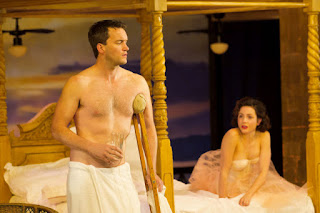Archived reviews and profiles by independent writer Steve Stratford of live theatre, music and dance. If you're viewing this site on your mobile, scroll to the bottom for the desktop view/ index.
Saturday, February 27, 2016
Iphigenia in Splott (Galeri, Caernarfon)
Let's get it out of the way first: Sophie Melville is remarkable in this play. It's a one-act, one-woman monologue which has a blistering story to tell, with twists and turns, shocks and surprises, joy and tragedy, just like your average episode of EastEnders.
But Melville doesn't just perform the monologue; she doesn't merely act out the role of Effie. Melville is Effie, she becomes her. With so much theatre, and particularly monologues, you can sense the performers acting. It's a largely unavoidable characteristic of theatre, the shared conceit between performer and audience that this is all artifice, it's pretend, make-believe. "We've paid good money to come and watch you mess about on stage for two hours."
But not when you watch Iphigenia in Splott. Because the performance is so magnetic, and the writing so truthful, that you're sucked into the fiction yourself, helped enormously by Effie's direct address to the audience at the start of the piece. It includes you, accuses you, and involves you. I was there with Effie in the Great Western pub, I was there with her in the bedroom with Lee, and I was certainly there with her in the ambulance. Boy, was I there!
Wednesday, February 24, 2016
The Glass Menagerie (Theatr Clwyd, Mold)
Characters haunted by their pasts. It's a common tool in all forms of drama, and in The Glass Menagerie it is placed front and centre by playwright Tennessee Williams, in what is to a great extent an autobiographical piece.
The play is often said to have five characters, one of them absent. Matriarch Amanda virtually lives in the past after being unceremoniously abandoned by her husband 16 years previously. Left alone to bring up her son and daughter in the difficult 1920s and 30s, Amanda yearns for her younger days when she had a line of "gentlemen callers" at the door, all courting her attentions. It must have been an exciting time in her youth, to have so much interest from and choice in men. The fact she chose her future husband, a man who turned out to be a huge disappointment to her, still haunts her, as she thinks back to the other men, the 'could-have-beens'.
Saturday, February 13, 2016
National Dance Company Wales Spring 2016 (Venue Cymru, Llandudno)
 |
| Folk |
It was a night with the National Dance Company of Wales. I expected contemporary dance - and I got contemporary dance - but what I didn't expect was to find myself at a rock concert!
That's the mood and atmosphere choreographer Jeroen Verbruggen wanted for his new piece A Mighty Wind, the second of three presentations at Venue Cymru from NDC Wales's Spring tour. And it's really quite exhilarating. To a soundtrack of stadium rock anthems, the dancers let rip, cavorting and moshing and headbanging their way around the stage as if they were at the V Festival, not a provincial seaside theatre.
Labels:
A Mighty Wind,
Folk,
National Dance Company Wales,
Tuplet,
Venue Cymru
Thursday, February 11, 2016
Cat on a Hot Tin Roof (Theatr Clwyd, Mold)
There's no denying that if you choose Tennessee Williams's Cat on a Hot Tin Roof as the first production of your inaugural season as artistic director, you're happy to invite comparisons with the 1958 film version, if only because that is how the majority of your audience will be familiar with it.
Which means you're immediately challenging your director and his cast by giving them a pretty high bar to reach. Your leading man has to be as simmeringly appealing as Paul Newman, and your leading lady has to have the gutsy charm and beauty of Elizabeth Taylor. It's asking for trouble.
Friday, February 05, 2016
Tipping Point (Pontio, Bangor)
If you end up sitting in the front row during a performance of Tipping Point, I guarantee you'll flinch at least once within the first few minutes. That's because Tipping Point is designed to be performed "in the round", with the audience as close to the action as it's safe to be, to enhance the intimacy of the experience.
I was in the second row, but I still ducked when a giant metal pole came careering toward my face. Except, there's never any danger for the audience, as the laws of physics simply prevent it. It's logical that the lower reach of a swinging pole gets shorter the higher it goes, but your eyes are telling you something quite different to your brain!
Monday, February 01, 2016
Play & Silence (The Other Room, Cardiff)
Three people incarcerated inside giant urns stand side by side on the postage stamp-sized stage at The Other Room. The trio are never seen at the same time, but spot-lit in quick succession as they deliver their rapid-fire lines. It's an odd set-up, but one which playwright Samuel Beckett was very particular about. Indeed, to change Beckett's specifications for Play would pretty much destroy the entire thing.
But while there may be three actors on stage (in their urns), Play actually has a cast of four, because stage manager Steffi Pickering has just as important a part to play - perhaps even more so - than the thespians. As each actor has to be in the spotlight as they say their lines - and as the lines are delivered with such uncompromising rapidity, one after the other, spilling back and forth between the three - it means Steffi has her work cut out making sure she keeps up with the spot. Beckett specified it must be one spotlight moving between the three, not three spotlights fading up and down.
Labels:
Play (Beckett),
Silence (Pinter),
The Other Room
Subscribe to:
Posts (Atom)




